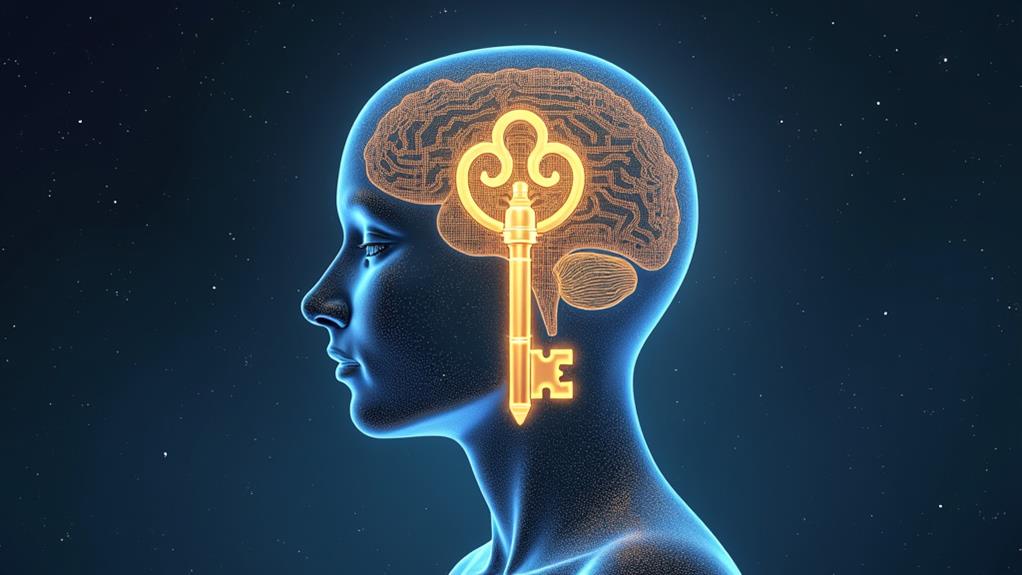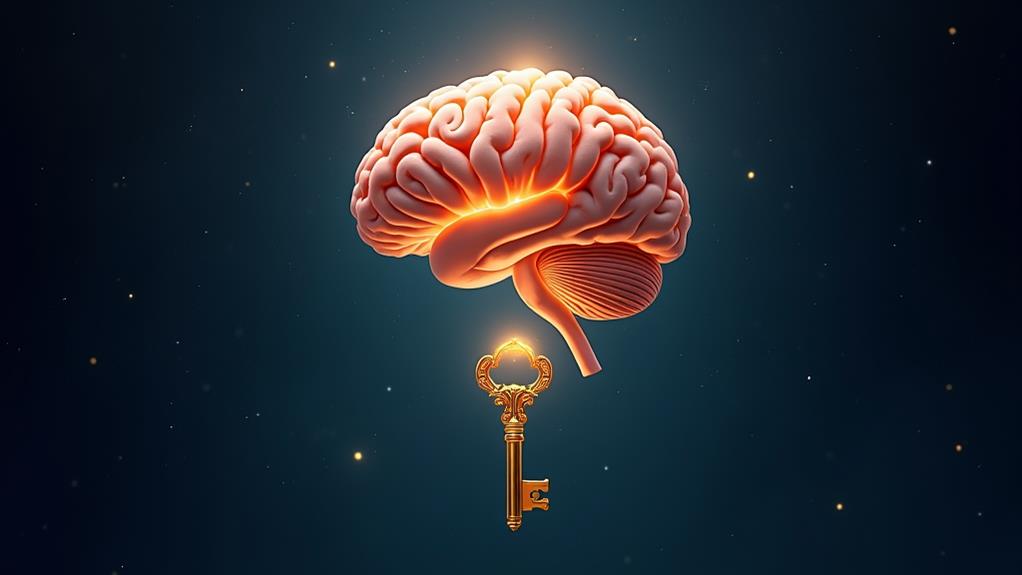
You possess the secret key to your mind, accessing the vast potential of your mind through the power of self-hypnosis. This technique isn’t about mind control; it’s about empowering yourself to access and transform your subconscious. By routinely engaging in self-hypnosis with vivid, sensory-rich visualizations and positive affirmations, you’ll find profound changes in mental clarity, emotional balance, and physical well-being. It allows you to tap into the subconscious for cognitive enhancement, emotional healing, and wellness visualization, dramatically boosting your mental and physical states. Exploring further, you’ll discover even deeper layers of your mind’s capacity for growth and self-empowerment.
Key Takeaways
- Harness the power of self-hypnosis to access and influence your subconscious mind for personal growth and emotional stability.
- Regularly practice visualization techniques, focusing on vivid, sensory-rich mental images to enhance mental clarity and emotional connection.
- Utilize positive affirmations within visualization to reinforce self-confidence and foster mental empowerment.
- Engage in mindfulness to strengthen the mind-body connection, promoting overall well-being and resilience against stress.
- Explore cognitive enhancement through hypnosis to expand mental capacity, optimize brain power, and boost memory and focus.
Understanding Hypnosis
You might’ve heard that hypnosis can take over your mind, but this is a common misconception.
In reality, hypnosis offers significant benefits, such as improving mental clarity and emotional well-being, by allowing you to access and influence your subconscious.
Understanding these truths can empower you to use hypnosis as a tool to enhance your life, rather than fearing it as a means of control.
Hypnosis Myths Debunked
Let’s clear up some common misconceptions about hypnosis.
First off, hypnosis isn’t about mind control; it’s a tool for self-empowerment and overcoming limitations. It allows you to access your subconscious mind, facilitating profound changes in habits and behaviors.
Dispelling misconceptions is pivotal. You’re always in control during hypnosis. It’s not about being made to act against your will but about harnessing your inner strength to make desired changes.
This understanding opens up practical applications, from stress reduction to pain management, illustrating the powerful mind-body connection.
Through self-hypnosis, you can tap into your subconscious, employing visualization and positive affirmations to reshape your life. This process not only empowers you but also reinforces the mind-body link, essential in overcoming physical and psychological barriers.
Benefits of Hypnosis
Hypnosis offers a myriad of benefits that can greatly enhance your quality of life by tapping into the subconscious mind‘s immense potential. By engaging with this powerful tool, you’re not only exploring a fascinating domain but also accessing capabilities that can elevate your mental and physical state.
Firstly, cognitive enhancement through hypnosis isn’t just about improving memory or boosting concentration—it’s about reshaping how you think and process information. You’ll find yourself absorbing details faster and recalling them with ease, making learning new skills more intuitive.
Emotional healing is another essential benefit. Hypnosis allows you to access deep-seated emotional blockages and work through them in a safe, controlled environment. This can lead to significant breakthroughs in personal growth and emotional stability, helping you to overcome past traumas and foster healthier relationships.
Wellness visualization during hypnosis isn’t merely a practice; it’s a transformative experience. By visualizing your body at its peak health, you reinforce the mind-body connection, encouraging physical healing and wellness. This technique has been shown to boost immune function and alleviate chronic pain.
Lastly, the mental empowerment achieved through hypnosis fosters a robust sense of self-confidence and determination. As you harness the power of your subconscious, you’ll find yourself driven to pursue goals with renewed vigor and clarity.
The Power of the Subconscious

Your subconscious isn’t just a storage unit for memories; it’s a powerhouse for channeling emotional strength and fostering imaginative goal creation.
When you tap into this part of your mind, you’re leveraging a dynamic force that can profoundly shape your reality and direct your energies toward achieving meaningful objectives.
Understanding and utilizing the subconscious effectively can reveal a deeper level of personal growth and achievement, far beyond the superficial layers of conscious thought.
Harnessing Emotional Strength
Within the depths of your subconscious lies a profound power to influence your emotional resilience and overall health. As you explore understanding this inner strength, you’ll find that emotional empowerment isn’t just a benefit—it’s a necessity for thriving in today’s world. Your mind and body are intricately linked, and by fostering a strong connection between the two, you can uncover remarkable capacities for emotional healing and intelligence.
Here are key aspects to ponder:
- Mind Body Connection: Recognize how your thoughts affect your physical state and vice versa. This awareness can lead to profound insights and more mindful living.
- Emotional Intelligence: Develop the ability to comprehend and manage your emotions, as well as those of others. This skill is crucial for personal and professional success.
- Emotional Resilience: Strengthen your capacity to navigate through adversity without losing your balance. It’s about bouncing back stronger every time.
Imaginative Goal Creation
Building on the understanding of emotional resilience, let’s explore how the subconscious mind plays a pivotal role in imaginative goal creation. Your subconscious, the deep-seated hub of emotions and memories, isn’t just a repository; it’s an active participant in shaping your reality through creative visualization and mental imagery. By harnessing these visualization techniques, you’re not just daydreaming; you’re designing your future.
Imagine you’re setting a goal. It’s not merely about jotting down objectives. It’s about vividly picturing yourself achieving these goals, feeling the success, and living the experience before it physically unfolds. This practice isn’t just motivational; it’s transformational. It’s a form of mind empowerment that primes your mental state, aligning your subconscious with your conscious ambitions.
Each time you engage in this process, you’re not only refining your visualization skills but also fortifying your mental resilience. You’re teaching your mind to dwell not on hurdles but on pathways to success.
Benefits of Self-Hypnosis

Self-hypnosis offers significant benefits that you mightn’t yet realize, particularly in enhancing mental health and improving physical well-being. By regularly practicing self-hypnosis, you’re not just calming your mind, but also fostering a deeper connection between your mental and physical states. This practice can lead to reduced stress and a better-regulated body system, impacting everything from your sleep patterns to how your body manages pain.
Enhancing Mental Health
Exploring the benefits of self-hypnosis can significantly enhance your mental health. By tapping into the power of your subconscious, you’re able to access and foster various mental and emotional benefits that can notably alter your daily life. Self-hypnosis, a tool of immense potential, is particularly effective in achieving mental clarity, emotional balance, and cognitive enhancement.
Consider how these key aspects work to improve your mental health:
- Mental Clarity: Self-hypnosis helps clear your mind, reducing noise and clutter. This leads to better focus and decision-making, enabling you to tackle tasks with a renewed sense of purpose.
- Emotional Balance: By engaging in wellness visualization, you can manage and mitigate feelings of stress and anxiety, leading to a more balanced emotional state. This practice helps in nurturing a calm, composed mind.
- Cognitive Enhancement: Techniques used in self-hypnosis facilitate deeper learning and memory retention, enhancing your cognitive abilities and allowing for an improved mind-body connection.
Through regular practice, self-hypnosis not only boosts your mental wellness but also empowers you to maintain these gains. It’s a gentle yet powerful way to align your subconscious with your conscious goals, leading to a healthier, more balanced you.
Improving Physical Well-being
As we consider the remarkable effects of self-hypnosis on mental health, it’s equally crucial to recognize its profound impact on physical well-being. Self-hypnosis strengthens the mind-body connection, a key link that influences your physical health. By engaging in healing visualization, you’re not just imagining recovery; you’re actively participating in your physical transformation.
Through wellness through hypnosis, you can address and alleviate various physical ailments. This process involves visualizing your body healing and operating at its best, which can lead to tangible improvements in conditions like chronic pain, digestive issues, and even hypertension.
The mental health benefits of self-hypnosis also contribute significantly to your physical state. A calmer, more positive mental landscape fosters a stronger immune system and enhances overall bodily functions.
Techniques for Effective Visualization

To harness the full potential of visualization, you’ll want to focus on crafting vivid mental images that are as detailed and sensory-rich as possible. This not only engages your mind more fully but also enhances the emotional connection, making the envisioned goals resonate deeper within you. By doing so, you’re not just imagining the future; you’re emotionally investing in it, which can greatly enhance the impact of your visualizations.
Crafting Vivid Mental Images
Crafting vivid mental images requires a deliberate and focused approach, enhancing your visualization skills greatly. You’re not just daydreaming; you’re constructing a mental space where your subconscious can engage actively, promoting mental resilience and fostering a deeper mind-body connection.
To start crafting these images effectively:
- Use positive affirmations: Begin with statements that reinforce your capability and intent. “I am powerful,” or “I am at peace,” sets a foundation for positive imagery and emotional healing.
- Engage all senses: Visualize not just what you see, but also what you smell, hear, and feel. This multisensory approach deepens the vividness and impact of your mental images.
- Practice regularly: Like any skill, visualization strengthens with practice. Dedicate time daily, even if just for a few minutes, to develop this technique.
These visualization techniques aren’t just about seeing an outcome; they’re about embedding these experiences into your psyche, enhancing your emotional and psychological resilience. By regularly practicing, you anchor these positive images and their associated feelings, making it easier to access them in challenging times.
This approach doesn’t just prepare you for future challenges but heals past wounds by reshaping your internal narrative.
Enhancing Emotional Connection
Building on the foundation of crafting vivid mental images, enhancing emotional connection through effective visualization techniques becomes a powerful tool in harnessing the full potential of your subconscious. By delving deeper into your emotional reservoir, you’re not just seeing images; you’re feeling them, transforming abstract visuals into palpable emotions that promote emotional healing.
Imagine you’re reconnecting with a loved one. Visualize not only their face but also recall the warmth of their embrace. This isn’t just relationship building; it’s crafting a bridge of empathy that strengthens bonds. Such techniques heighten your emotional intelligence, enabling you to better understand and manage your feelings and those of others.
Moreover, the mind-body connection in visualization practices isn’t just theoretical. When you visualize peace and calm, your body responds. Your heart rate slows, breathing deepens, reinforcing mental resilience against stress and anxiety.
Expanding Mind Capacity

As you explore the territories of enhancing cognitive abilities and accessing mental potential, consider the vast capacities of your own mind. You’re not just hardwired for basic functions; you have the potential to cultivate a sharper, more expansive cognitive landscape. By focusing on organized mental exercises and adopting new learning strategies, you can notably broaden the horizons of your intellectual abilities.
Enhancing Cognitive Abilities
In the field of cognitive enhancement, expanding your mind’s capacity through hypnosis offers a fascinating and largely unexplored potential. By harnessing this approach, you’re not just improving memory; you’re accessing a broad range of cognitive enhancements that elevate your mental performance on several fronts.
Hypnosis can directly impact your cognitive abilities by fostering:
- Memory enhancement: Strengthening your ability to recall information quickly and accurately.
- Cognitive focus: Sharpening your concentration, allowing you to maintain attention on tasks for longer periods without succumbing to distractions.
- Intelligence boost: Enhancing overall mental acuity and processing speed, making learning and problem-solving easier.
These benefits are grounded in the ability of hypnosis to tap into the subconscious, promoting a deeper level of mental clarity and optimized brain power. It’s not merely about being smarter but transforming how your brain operates to maximize its potential.
Imagine your mind functioning with heightened clarity and focus, enabling you to grasp complex concepts faster and remember details with greater ease. Hypnosis isn’t just a tool for entertainment; it’s a key to accessing a more powerful version of yourself.
Embrace this method, and watch as your cognitive abilities expand beyond what you thought possible.
Unlocking Mental Potential
Exploring the vast reaches of your mind’s potential through hypnosis reveals capacities that often remain dormant under conventional methods. This technique isn’t just about deep relaxation; it’s a gateway to revealing potential that enhances cognitive functions and fosters mental clarity.
You see, your brain power isn’t fixed. It’s elastic, capable of expanding beyond the limits you’ve perhaps unwittingly set for yourself.
When you tap into self-hypnosis, you’re not just playing with an abstract concept; you’re engaging in a profound mind-body connection. This connection underscores how intertwined your thoughts and physical state are.
By achieving a hypnotic state, you pave the way for significant cognitive enhancement. Think of it as upgrading the software of your brain to run more efficiently, process information faster, and store it more effectively.
Imagine clearing the fog that sometimes clouds your thinking. This clarity isn’t just about sharpening your focus; it’s about reshaping your entire approach to mental challenges.
Hypnosis helps you access the subconscious, where deep-seated patterns and ideas reside, transforming your inner landscape to support your outer goals.
Let’s harness this power, expanding your mind’s capacity like never before.
Frequently Asked Questions About The Secret Key To Your Mind
How Does Hypnosis Differ From Meditation or Mindfulness Practices?
Hypnosis differs from meditation as it involves specific techniques to access your subconscious and influence behavior, unlike more general meditation practices that focus on awareness and presence.
While both enhance the mind-body connection, mindfulness primarily cultivates an ongoing awareness of the present moment, benefiting overall well-being.
Hypnosis, however, often targets specific issues using tailored suggestions, making it a potent tool for directed change in your life.
Can Hypnosis Uncover Lost or Repressed Memories Reliably?
Hypnosis can aid in memory retrieval, but it’s not always reliable for uncovering lost or repressed memories. While it offers therapeutic benefits in trauma processing, ethical considerations must guide its use. The scientific validity of hypnosis as a tool for accurate memory recall remains debated.
You should approach it cautiously, understanding its potential benefits and limitations, to guarantee it’s used ethically and effectively in therapeutic settings.
Are There Any Age Restrictions for Practicing Self-Hypnosis?
You might wonder if there are age limits for self-hypnosis. Generally, there aren’t strict age restrictions. Children’s hypnosis, teenage hypnosis, and elderly hypnosis can all be safe and beneficial if tailored appropriately. It’s important, however, to make sure the techniques are age-appropriate and focus on safety.
The benefits of hypnosis, like enhanced relaxation and improved focus, apply across ages, making it a versatile tool for personal development. Always consider individual readiness and maturity.
What Are the Risks or Potential Side Effects of Hypnosis?
You’re considering hypnosis, but what about the risks? Ironically, while it’s often seen as a mind-control technique, the real side effects can be subtler—like false memories. Always follow safety precautions and seek professional guidance to mitigate risks.
Long-term effects are generally positive, yet it’s essential to approach this powerful tool with awareness.
Hypnosis isn’t just a party trick; it’s a gateway to deeper self-understanding, when used responsibly.
How Long Does It Typically Take to See Results From Self-Hypnosis?
The time it takes to see results from self-hypnosis varies widely due to individual differences. Consistent practice, using techniques like visualization and affirmations, enhances effectiveness. You might notice benefits within a few weeks, but it’s essential to maintain regular sessions.
Drawbacks are minimal, yet effectiveness can fluctuate based on personal commitment and the clarity of your goals. Keep your approach flexible, adapting as needed to fit your progress and experiences.
Conclusion
Imagine yourself as a skilled gardener of your own mind, where thoughts are like seeds and self-hypnosis is your toolset. As you nurture these seeds with the techniques of visualization and tap into the subconscious, they blossom into robust plants—your enhanced memories, controlled pain, and conquered habits. Just as a garden requires patience and care, so does the cultivation of your mental landscape. Embrace this journey, accessing the lush potential within you, and witness the transformative power of your cultivated inner garden.

Take the Next Step, Make An Appointment
Do not be afraid to reach out to me, Mark , to assist you in any issues you might have. Need a good listener or someone to confidentially talk too? . Life Coaching is 45 minute session, once a week.
Self-Hypnosis is taught in one session, individual sessions or in a group, and lasts a lifetime. Most Hypnotherapy sessions including Age regression last 2 hours and EFT Sessions are usually handled with a one hour session
To make an appointment, first listen to the Pre-talk and fill out the Complementary Healthcare Provider Disclosure. The use the Contact Form to request an appointment with, Mark, The Bohol Hypnosis Expert.
Self-help downloads are available to help you with specific problems. The self-hypnosis program to teach you how to self-hypnotize yourself is available here.





